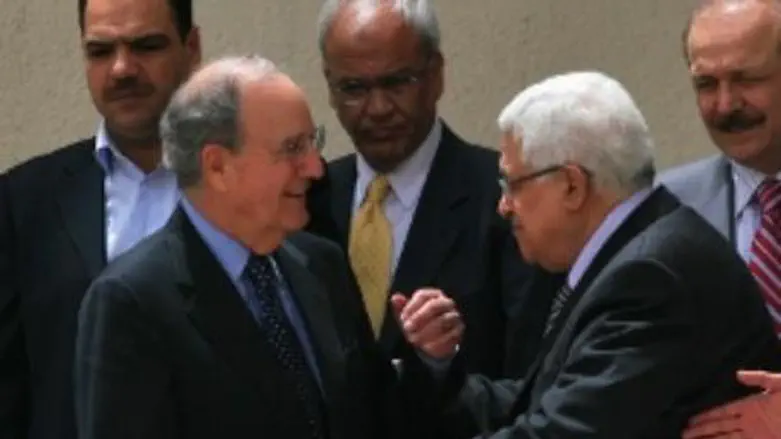
U.S. Middle East envoy George Mitchell meets Palestinian Authority Chairman Mahmoud Abbas Tuesday morning in Ramallah for Round Two of the American-mediated “proximity talks” as the PA says it expects an “agreement” without negotiations. Mitchell is to talk with Prime Minister Binyamin Netanyahu later in the week, probably Thursday.
"The Israeli side has just two options, either peace or the continuation of the settlements. Israel cannot have both at the same time," PA negotiator Saeb Erekat told the French news agency AFP Monday. "For now we will focus on the issues of borders and security in order to demarcate two states along the 1967 border," he added.
In a separate interview with the Chinese news agency Xinhua, Erekat said that the PA ”doesn't oppose to make slight, equal exchange of lands," but he offered the possibility on condition that a trade does not “harm the space of the land that Israel has occupied in the 1967," including areas in northern, southern and eastern Jerusalem.
Round One of the talks almost seemed to be the first and last, with neither side giving ground. Instead, Mitchell returned to the United States and then stated that Prime Minister Binyamin Netanyahu had agreed to stop building more housing for Jews in the Jewish neighborhood of Ramat Shlomo, part of Jerusalem where the PA demands sovereignty and the capital of a new Arab state.
Israel denied having promised to halt current construction, and the Ramat Shlomo housing is in effect irrelevant because the bureaucratic process for final approval is expected to take approximately two more years.
To strike a balance, Mitchell asked the PA to make an effort to tone down the anti-Israel incitement and hatred that it promised to halt in previous agreements dating back to the Oslo Accords and more recently in the now dormant Roadmap seven years ago.
Even before the talks begin Tuesday, Nabil Abu Rudainieh, the senior spokesman for the PA, said that the indirect talks will probably not succeed because of "Israeli stubbornness and insistence to continue building in settlements."
The PA already is setting its sights on the next United Nations General Assembly, where pro-Arab sentiment is growing to unilaterally declare the Palestinian Authority as a new Arab country within Israel’s borders. The General Assembly’s next session in September coincides with the end of the four-month deadline the Arab League has set for Israel to agree to PA demands.